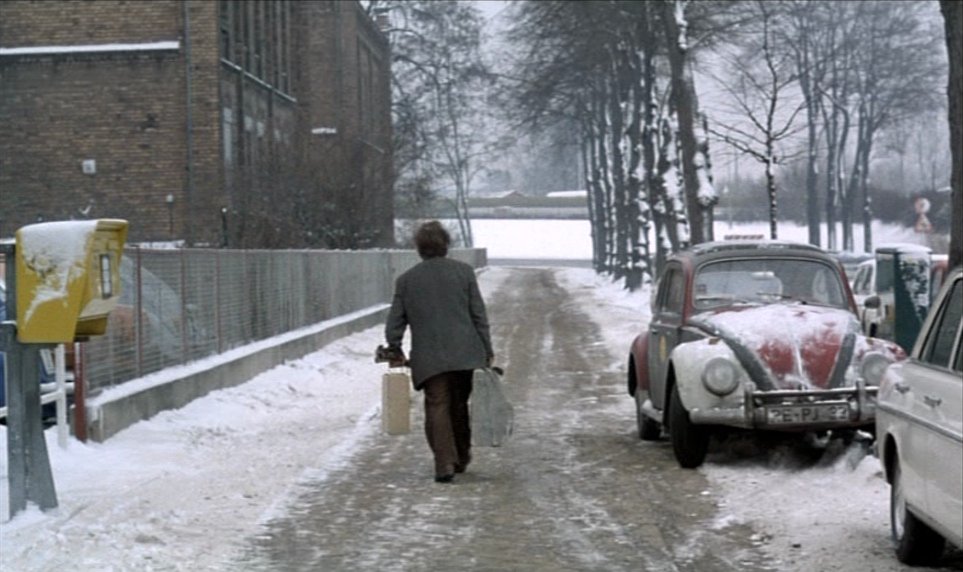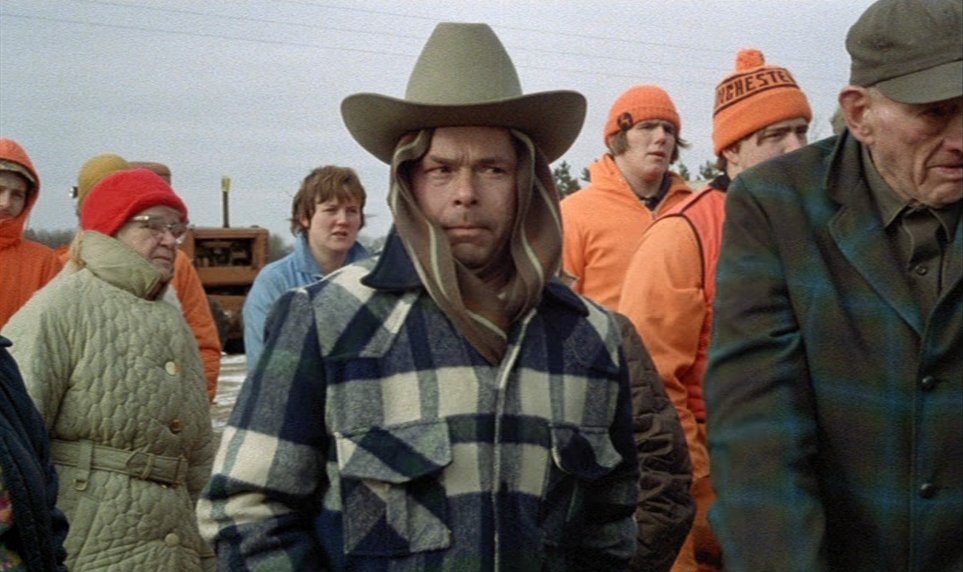Best Reels: Cult Cuts | Herzog's "Stroszek" and the Courage in Confusion
“There are so many things that frighten and disturb me. We simply know so little about human beings."
After a doctor (Vaclav Vojta) explains his grim, almost anthropophobic world outlook to the simple-minded ex-con and street musician Bruno (Bruno Schleinstein), he demonstrates the remarkable grip strength of a newborn infant. Hoisting the screaming infant up as it dangles from his fingers, the doctor tells Bruno that this baby has the potential to be president one day.
Prolific German auteur Werner Herzog sees both the inherent evil in human beings—our proclivity for violence and other depraved acts—as well as our potential for goodness and our endearing perseverance. In his 1977 film, Stroszek, he explores the line we all walk between these two warring sides. This line, like the strip of land in rural Wisconsin contested over by the film’s two shotgun-wielding farmers, is always hanging in a delicate balance, never really certain or stable.
As an ex-con and an alcoholic, but also someone who cares for others and has a knack with instruments, Bruno is destined to walk this line, always carrying with him the burden of potential to veer into one extreme or the other. When released from prison in Berlin, Bruno finds his sex worker friend Eva's (Eva Mattes) pimps bearing down on him, pushing him towards the brutality that humans are capable of. Fortunately, Bruno's kindly neighbour, Scheitz (Clemens Scheitz), has a plan to move to the United States, where he, Bruno and Eva can start anew and (hopefully) rediscover the decency in humanity. But in trying to convince themselves that a foreign country’s inhabitants aren’t like them, aren’t wrestling with their own internal teeter-totters, Herzog’s three Germans enter the United States woefully optimistic.
Transplanting themselves into the fictional "Railroad Flats," Wisconsin—itself a city with metaphorical lines leading to other states—the sad-sack trio is initially met with kindness, a new roof over their heads, jobs, and even a colour television. They settle into their new lives naturally enough, but eventually come to realize that the "American dream" is desolate, and that the corruptness of humans still exists—it is just more veiled.
Eva falls back into sex work and is preyed upon by leering truck drivers; Bruno falls back into drinking and fuels his contempt for his low-paying job; meanwhile, Scheitz becomes curiously occupied with investigating animal magnetism. The latter may seem like a trivial and needlessly quirky thread to the story, but it could have something to do with the film's finale. In the climactic scene, Bruno happens upon a roadside attraction where a chicken is made to "dance" for 25 cents, its enclosure wired to deliver electric shocks. Bruno winds up at this bizarre spectacle after his home is repossessed, and after a misguided robbery attempt separates him from Scheitz. In his frustration and disillusion, he absconds with a shotgun, some stolen beer, a frozen turkey, and a tow truck, the last of which he leaves doing circles in a parking lot near the roadside attraction (perhaps a nod to a scene in Herzog's previous work, Even Dwarfs Started Small). In the end, Bruno sees in the chicken what he comes to realize of himself: that he is a tortured and trapped animal whose conflicting electrical impulses have him dancing a sad and pointless dance. (Earlier, when Scheitz tests his magnetic detection device on Bruno and Eva, he concludes that Bruno’s body houses the stronger charge.)
And so, after reckoning with the weird zones that separate moralistic and debased society, Bruno decides to stir up a little anarchy—that which makes the most sense to him in his confused state. Indeed, "confused" seems to be where most of those caught between their warring tendencies come to end up existing. The confused in Stroszek are poignantly realized in Herzog’s immigrants, who, as well as battling internal conundrums, are also facing culture shock, discrimination, language barriers, and more. Their spatial, social, and cultural disorientation compounds their internal conflict, just as their struggles with identity distort their worldviews. Bruno, Eva, and Scheitz are caught in a cruel cycle, and this is what makes them so tragically fated to fail.
Stroszek is bleak, but only in a self-knowing way. Really, it is a simple and quiet tale of social realism, told economically in order to both mask and make evident its larger themes. While its comedy was a little lost on this viewer in 2022, its warmth shone through, and endeared me to even its darker moments. In the way Bruno cares unquestionably for Eva in the film, you get the sense that Herzog too is obstinately sympathetic towards his characters, and that he wants to hold them and soothe them, just like the doctor eventually soothes the future-president baby.
We have to see hope in our world, and we have to cherish that hope, even if we know it is more likely that the baby Herzog filmed grew up working a standard 9-to-5, feeling as frustrated as the rest of us. At the very least, we have to acknowledge that we are confused, caught between hope and hopelessness, and that there is strength in our confusion. In Herzog’s eyes, at least confusion means we are carrying on.


